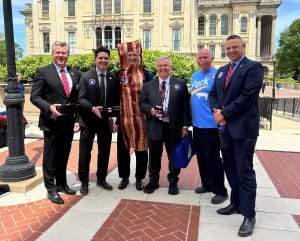Canada Claims COOL Cost its Producers $2 Billion
January 15, 2013

U.S. country-of-origin meat-labeling rules have directly cost Canada's hog and pork industry more than $2 billion, according to a report that could help determine retaliation against U.S. exports if Washington does not change its requirements. Details of the report were released Monday by Reuters.
The United States must bring the labeling rules, known by the acronym COOL, into compliance with a World Trade Organization ruling by May 23, 2013, according to a WTO decision released last month.
But citing no apparent movement by the U.S. Congress since the original WTO ruling in mid-2012, the Canadian Pork Council released an estimate of damages on Monday. The council called on Ottawa to impose retaliatory tariffs on imports from the United States if there is no change by the WTO deadline.
“COOL continues to cost hog and cattle producers tens of millions of dollars every month and must be dealt with sooner rather than later,” says Jean-Guy Vincent, a Quebec hog farmer and chairman of the Pork Council.
The labeling program has led to a sharp reduction in U.S. imports of Canadian pigs and cattle because it has raised costs for U.S. packers by forcing them to segregate imported animals from U.S. livestock.
Some U.S. groups have said COOL offers consumers valuable information about the origin of their food.
The Pork Council's report, written by economist Ron Gietz, calculated that the labeling rules had cost Canadian farmers $2 billion in lost hog exports by the end of 2012, plus an additional $442 million in reduced pork shipments and suppressed prices for feeder pigs.
Canadian Agriculture Minister Gerry Ritz has soundly criticized the U.S. labeling program, but said on Monday it's too early to assume the United States will not comply with WTO rules before the deadline.
“We expect that the United States will bring itself into compliance with its WTO obligations by May 23,” Ritz says in an e-mailed statement to Reuters. “It is premature to speculate on retaliatory measures at this time.”
Nkenge Harmon, a spokesperson for U.S. Trade Representative Ron Kirk, also said it's too soon to discuss potential Canadian retaliation related to COOL.
“To determine our next steps, we are working with our colleagues at (U.S. Department of Agriculture) and consulting with relevant stakeholders, including Congress,” Harmon says.
U.S. officials have previously said they intend to bring COOL into compliance by the WTO's deadline.
The WTO ruled on June 29 that the U.S. country-of-origin labeling program unfairly discriminates against Canada and Mexico because it gives less favorable treatment to beef and pork imported from those countries than to U.S. meat.
The Pork Council report does not address damages to the Canadian cattle industry, or to Mexico's livestock sector.
Meat labels became mandatory in the United States in March 2009 after years of debate. U.S. consumer groups and some farm groups supported the requirement, saying shoppers should have information to be able to distinguish between U.S. and foreign products.
Big meat processors opposed the provision, which they said would unnecessarily boost costs and disrupt trade.
The U.S. labeling law requires grocers to put labels on cuts of beef, pork, lamb, chicken and ground meat or to post signs that list the origin of the meat.
You May Also Like


